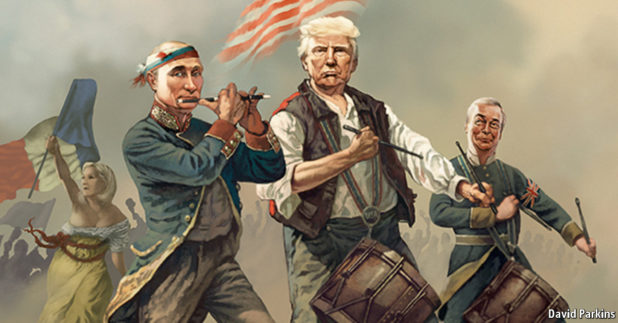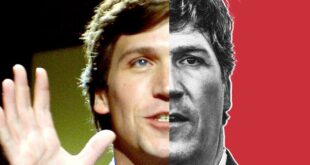Hunter Wallace
Occidental Dissent
November 18, 2016
“WHEN Donald Trump vowed to “Make America Great Again!” he was echoing the campaign of Ronald Reagan in 1980. Back then voters sought renewal after the failures of the Carter presidency. This month they elected Mr Trump because he, too, promised them a “historic once-in-a-lifetime” change.
But there is a difference. On the eve of the vote, Reagan described America as a shining “city on a hill”. Listing all that America could contribute to keep the world safe, he dreamed of a country that “is not turned inward, but outward—toward others”. Mr Trump, by contrast, has sworn to put America First. Demanding respect from a freeloading world that takes leaders in Washington for fools, he says he will “no longer surrender this country or its people to the false song of globalism”. Reagan’s America was optimistic: Mr Trump’s is angry. …”
Europe’s Biggest Populist Danger:
“ONE by one, liberal democracies are waking up to find their certainties trampled by the march of close-the-borders populism. First came the vote for Brexit, then Donald Trump’s election as America’s next president. Now France is bracing itself for a momentous presidential vote in 2017 in which the stakes could not be higher—not just for the well-being of France, but for the future of Europe itself. …”
“AFTER the sans culottes rose up against Louis XVI in 1789 they drew up a declaration of the universal rights of man and of the citizen. Napoleon’s Grande Armée marched not just for the glory of France but for liberty, equality and fraternity. By contrast, the nationalism born with the unification of Germany decades later harked back to Blut und Boden—blood and soil—a romantic and exclusive belief in race and tradition as the wellspring of national belonging. The German legions were fighting for their Volk and against the world.
All societies draw on nationalism of one sort or another to define relations between the state, the citizen and the outside world. Craig Calhoun, an American sociologist, argues that cosmopolitan elites, who sometimes yearn for a post-nationalist order, underestimate “how central nationalist categories are to political and social theory—and to practical reasoning about democracy, political legitimacy and the nature of society itself.” …
Of all the people in the world, it is nationalists who are now the least inclined to support devastating world wars. It is globalists who want to intervene in Syria, establish no-fly zones, put troops on Russia’s border, encircle China with military bases, and overthrow governments in the name of “democracy.”
 Daily Stormer The Most Censored Publication in History
Daily Stormer The Most Censored Publication in History



